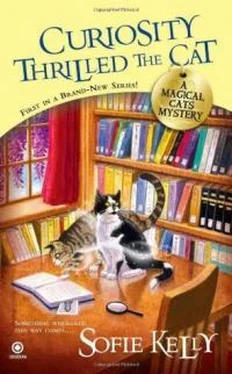Then it hit me. Who knew more about music—classical and contemporary—than Dr. Lise Tremayne, curator and librarian for the music collection at Boston University? I didn’t even have to look up the number.
It was early afternoon in Boston. “Dr. Tremayne,” she answered on the third ring. The sound of Lise’s voice, with its perfect enunciation and touch of French accent left from the years she worked and studied in Paris, immediately made me homesick.
“Hi, Lise. It’s Kathleen,” I said.
“Kath! How’s life in the land of a thousand lakes? You haven’t been carried off to become the consort of Bigfoot, have you?”
I laughed. Lise might seem like a big-city intellectual, but I knew she’d grown up in rural Maine, so far north that the next stop was Canada. She’d dug potatoes and stacked firewood and could dress a deer. Her highbrow friends would have been shocked to find out that the braised partridge they’d savored at one of Lise’s elaborate dinner parties had been running around the Maine woods right before her annual “fall retreat.”
“No, I haven’t been abducted by Bigfoot.” I swiveled in my chair so I could look out over the lake. Even though there were more clouds—which meant Harry was probably going to be right about the rain—the sun still sparkled on the water. The grass, which Harry must have come and cut right after he left my house, was a deep, rich green and the flower bed was an artist’s palette of color. My homesickness eased a little.
“It’s beautiful here, Lise,” I said. “I’m sitting here at my desk, looking out over the lake. The sun is shining. The air is clean—”
“—and all the little forest animals come into the library to help you shelve books while you whistle a happy tune,” she said drily.
“No, but you’d be surprised how useful squirrels can be for getting books up on the top shelves.” She must have known what was coming next. “And,” I added, “they work for peanuts!”
“I miss you, Kath,” Lise said, laughing.
“I miss you, too.” I had to swallow a couple of times to get rid of the sudden lump in my throat.
“So, tell me about your library.” I pictured her leaning back in her chair, propping her feet, in some ridiculously expensive pair of sandals, on the edge of her desk. “Is it really one of the original Carnegie buildings?”
“It is,” I said. I told her about the stone building and the renovations. I left out the fact that it was a possible crime scene and I was a possible suspect.
I took a deep breath. “Lise, the reason I called is I’m looking for some information. Do you know anything about Gregor Easton, the conductor?”
“I know he died just a couple of days ago.”
“He died here, Lise.”
“There? What was Easton doing in Smallville, Minnesota?”
“Mayville,” I said. I held the phone with one hand and stretched my other arm over my head. “He was here for the Wild Rose Summer Music Festival. He’s—he was—guest conductor and clinician.”
“I’ve heard of the festival.” Lise’s voice turned pensive. “I didn’t realize that was where it was.” I could hear her tapping a fingernail against the side of the phone. “But what was Easton doing there? It’s not his usual type of venue.”
I shifted in the chair and pulled my legs up under me. “He was a last-minute replacement for Zinia Young.”
“Now, your festival would be Zinia’s type of event.”
“She had to bow out at the last minute, so Easton volunteered to fill in.”
“Volunteered? I don’t think so.”
“That came straight from someone on the festival board,” I said. “I guess he offered because he and Zinia are close friends.”
An inelegant snort of laughter came through the receiver. “Gregor Easton doesn’t have friends,” Lise said. “He has—had—sycophants and people he was using. Easton and Zinia were not friends. Trust me, if he volunteered, there was something in it for him.”
The man Lise was describing did sound like the man Ruby and Maggie had talked about in class, like the man I’d encountered at the library.
“What else do you know about Easton?” I asked. I kept waiting for Lise to ask me why I was asking for information about the man.
“He wasn’t well liked in the classical music world,” Lise said. “He was arrogant—even for a conductor.”
“So I’ve heard.”
“Now, to be fair, he was considered to be a first-rate composer, deservedly so, from what I’ve heard. But technically he wasn’t anywhere near as gifted.”
“What do you mean, technically?” I asked. I heard Lise’s feet drop to the floor and I knew she was probably reaching across her desk for her coffee.
“His playing—and conducting, too—weren’t close to the caliber of his composing. Do you remember Dr. Mitton?”
I thought for a moment. “Wasn’t he musician in residence a couple of years ago? He was English.”
“That’s him.” I imagined Lise nodding on the other end of the phone. “He once compared Easton’s piano playing to that of a three-year-old on a toy keyboard.”
“That’s harsh,” I said.
“That’s the kind of response Easton generated in people,” she said. “I heard him play once, years ago, and while he was good, he wasn’t great. The music was beautiful, but he didn’t seem to connect with it. It was almost as though he hadn’t written his own score. It was so much better than his playing. The best versions of his compositions have been played by other people.”
That was interesting, though I had no idea how it might help me. I glanced at my watch. There was a lot more I wanted to know, but I was running out of time.
“Lise, do you know anything about Easton’s background?” I asked. “Where he grew up, where he got his first degree?”
“I don’t.” I pictured her shaking her head, blond curls bouncing. I felt another sting of homesickness. “But I can ask around, discreetly, of course, if you’d like me to.”
“Please,” I said. I gave her my home phone and my cell number. If we missed each other, I didn’t want a message about Gregor Easton left for me at the library.
“So, Kath,” Lise said. “Why all the interest in a dead conductor?”
So I wasn’t going to get away without answering some questions myself after all. “This stays between us?”
“Absolutely.”
“I found his body.”
“Oh, Kath, I’m sorry. Are you all right?”
“Yeah, I am. Thanks,” I said. “The thing is, the police still have some questions and so do I.”
“Do you mean there was some kind of accident, or are you saying someone killed him?” I heard the surprise in her question.
“Lise, I honestly don’t know for sure,” I said. “I can tell you that it looks like the library is one of the last places he was before he died. Somehow he got into the building after hours.”
“And you want to know why a renowned composer was breaking into your library.”
That, and why would someone want to kill him at all, not to mention who did. But I didn’t say that out loud.
“I thought the biggest problems you’d see out there would be grizzly bears and killer mosquitoes.”
“Maybe I’m just being nosy. It’s probably going to turn out that Easton had a stroke.”
“Well, let me see what I can find out and I’ll get back to you.”
I thanked her and we both said good-bye. I hung up the phone and stood up, giving my right foot—which had fallen asleep—a shake. I stood in the doorway of my office. And looked down to the main floor of the library. In the time I’d been on the phone, Will Redfern’s men had taken the temporary circulation desk apart. One of the workers was spreading a heavy canvas tarp over the floor where the desk had sat. The front doors were propped open and another man came in, carrying what looked to me like pieces of steel staging.
Читать дальше












